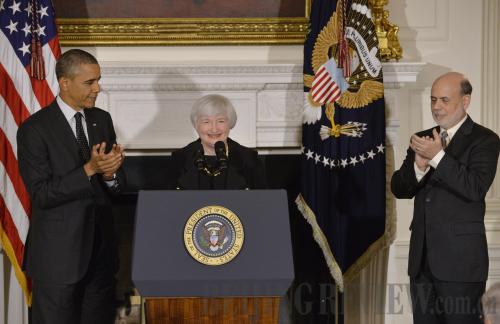|
 |
|
NOMINATION: U.S. President Barack Obama and current Federal Reserve Chairman Ben Bernanke listen as Janet Yellen speaks at the White House in Washington, D.C. on October 9 (ZHANG JUN) |
When U.S. President Barack Obama deliberated on who to nominate as chair of the U.S. Federal Reserve, the gender of the nominee may not have been high on the list of criteria. However, with the nomination of Janet Yellen, a woman could soon become head of the most powerful job in central banking.
In light of the slow economic recovery and debt impasse of the United States, observers believe U.S. financial leaders prefer a relatively moderate central banker like Yellen. The majority argues that Yellen's appointment is a positive sign for the U.S. economy, as she will perhaps continue the quantitative easing (QE) policy of the incumbent Federal Reserve Chairman Ben Bernanke. However, some pessimists worry that postponing the end of the QE policy might inflate financial market bubbles and lead to hidden dangers resulting in a new round of crisis.
Economic hot wire
Economic observers claimed that the nomination of Yellen is a strong signal of continuity at the Fed and the news will likely produce a shot in the arm for the U.S. economy.
Ding Meng, a senior foreign exchange analyst at Bank of China, said Yellen is more conservative than Bernanke. "She will certainly continue the policies of Bernanke, keeping borrowing rates low to accelerate growth and lower unemployment. It is good news at least in the short term and brings a certain amount of stability to the U.S. market," said Ding, adding "The lower level of risk associated with her policies is highly welcomed by investors. Stimulated by the good news, the dollar appears to be on the rebound."
The Wall Street Journal website reported on Yellen's nomination, quoting many economists who remarked that she is more qualified for the job than any of her predecessors.
In the same story, Robert Shiller from Yale University said Yellen is the kind of genuine and persuasive person who will be able to make good policies, even amid raucous debate and disagreements. Greg Mankiw, a professor of economics at Harvard University, voiced his support for President Obama's "great decision" in choosing Yellen to chair the Federal Reserve.
Yellen, a life-long economist who began her policymaking career in 1994 as a Federal Reserve governor, is known for favoring strategies that reduce unemployment even at the risk of driving up inflation. At the Fed, Yellen has built a reputation as a "dove"—someone who is typically more concerned about keeping interest rates low to reduce unemployment than about raising them to avert high inflation. She has strongly supported Bernanke's unorthodox but purportedly necessary efforts to revive the economy and bring down the unemployment rate, and to expand the Fed's thinking beyond its traditional fixation with inflation.
| 